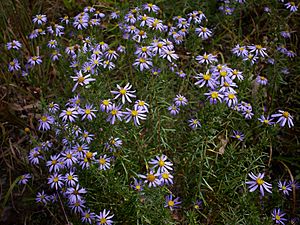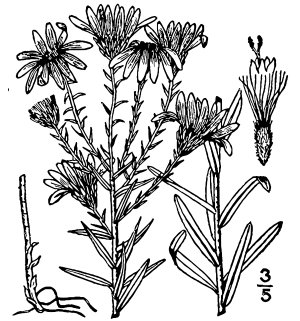Ionactis linariifolia facts for kids
Quick facts for kids Ionactis linariifolia |
|
|---|---|
 |
|
| Scientific classification | |
| Kingdom: | |
| (unranked): | |
| (unranked): | |
| (unranked): | |
| Order: | |
| Family: | |
| Genus: |
Ionactis
|
| Species: |
I. linariifolia
|
| Binomial name | |
| Ionactis linariifolia (L.) Greene 1897
|
|
| Synonyms | |
|
Synonymy
Aster linariifolius L. 1753
Aster pulcherrimus Lodd. Aster rigidus L. Chrysopsis linariifolia (L.) DC. Diplopappus linariifolius Lindl. Diplopappus linariifolius (L.) Hook. Diplopappus rigidus Lindl. Diplostephium linariifolium (L.) Nees Diplostephium rigidum (Pursh) Sweet |
|
The flax-leaf ankle-aster (Ionactis linariifolia), also known as flaxleaf whitetop, is a beautiful wild plant. It belongs to the daisy family, which is a very large group of flowering plants. You can find this plant growing in many parts of North America.
Contents
Discover the Flax-Leaf Ankle-Aster!
This plant is officially called Ionactis linariifolia. But it also has some fun common names like "flax-leaf ankle-aster" and "flaxleaf whitetop." Sometimes people just call it an "aster." It is a native plant of North America.
Where Does This Wildflower Grow?
The flax-leaf ankle-aster grows across a large area of eastern and central North America. You can find it from Florida in the south all the way north to Québec and New Brunswick in Canada. It also stretches west into the far eastern part of Texas. This shows it can live in many different environments!
What Does the Flax-Leaf Ankle-Aster Look Like?
This plant is an herb, which means it has soft stems, not woody ones like a tree. It can grow up to about 70 centimeters (28 inches) tall. Its leaves are green, long, and narrow, reaching up to 4 centimeters (1.6 inches) in length.
When it blooms, the flax-leaf ankle-aster usually produces several flower heads. These flower heads often grow in a flat-topped group. Each flower head is quite pretty! It has ray flowers around the outside, which can be blue, white, or violet. In the center, you'll find many small yellow disc flowers.
How Did This Plant Get Its Name?
The flax-leaf ankle-aster has had a few different names over time. It was first described by a famous scientist named Carl Linnaeus in 1753. He named it Aster linariifolius, which means "stiff-leafed aster."
Later, in 1897, another botanist named Edward Lee Greene decided that this plant was special enough to be in its own group. He classified it into a separate genus called Ionactis. That's why its full scientific name today is Ionactis linariifolia.


